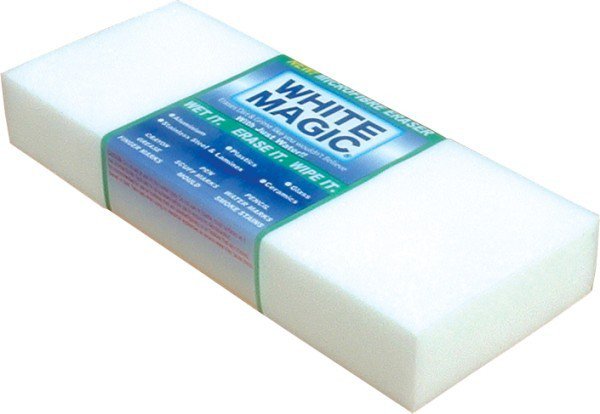
Yes, I’m a guilty “Magic Sponge” user. Not any more though!
TLDR: Simple and nasty. STOP using these “Magic Sponges. You are coating your kitchen with microplastics. Go here to see what we have in our kitchen.
“Magic Sponges” Are Anything But Magical—Your Kitchen Cleaning May Be Sabotaging Planet and Health

Let’s face it: that white “magic” sponge that erases everything from scuff marks to dried paint?
It’s a cleaning miracle... until you realize it’s quietly shedding trillions of microplastic fibers every month.
Yes, every swipe is a tiny environmental assault. Science just blew the lid on it, and your scrubbing sponge may be the culprit.
The Dirty Truth Behind the “Magic”
These things feel like miracles—wet ‘em, scrub ‘em, the mark vanishes. The secret? Melamine foam, made of poly(melamine-formaldehyde). It's like a fine-grit sandpaper disguised as a sponge. But that abrasive power comes at a cost: wear it down—and those microscopic plastic fibers go flying.
Here’s what caught my eye: Researchers from the American Chemical Society tested everyday ones from major brands. They simulated real-life wear by rubbing the sponges against rough metal. Each gram of used sponge shed—brace yourself—6.5 million microplastic fibers. That wasn’t a typo. That’s literally millions.
Use some quick math and Amazon sales data from August 2023? That equals a staggering 1.55 trillion microplastic particles flung into the environment every month. And that number only counts one single retailer. The real figure is probably higher.
Tiny Particles, Serious Fallout
These microplastics don’t magically vanish. They drift off into air, water, soil—and yes, likely into your food and body. Microscopic? Sure. But their impact isn’t. They’ve been found in human lungs, livers, brains, reproductive organs—you name it. Potential health fallout ranges from immune disruption to organ damage, heart risk, even cognitive decline. (They’re even tracking into dementia patients. Yikes.)
On the bright side, one study flagged that freshwater creatures like daphnia magna—the bug that fish feed on—only had 52% survival when exposed to high levels of these fibres over 21 days. Pollution’s not just a problem, it’s biological bullying.
What Makes “Magic Sponges” So Insidious?
- They feel harmless. Just water and a bit of scrubbing, right? But every use chips off plastic particles you can’t see.
- They’re everywhere. Easy to buy, cheap, and advertised as perfect for everything. That convenience comes with a hidden cost.
- Densest sponges bleed less—not zero. Even the solid ones eject fibers, just slower.
- Tracking the real scale is hard—but not impossible. One site, one retailer... and we’re already at a trillion+ fibers monthly. Multiply that globally, and it's beyond absurd.
This Isn’t Just Guilt-Tripping—It’s Fixable
Trashing all your magic sponges isn’t the end of civilization. Humans are smart. The fix? Think simple, effective, and less plastic.
- Use tougher, denser sponge alternatives. They degrade slower and shed less.
- Better yet—swap to natural cleaning tools. Cotton, cellulose, bamboo—anything that doesn’t rain plastic dust.
- Install good filters. Trap those fibers before they hit your water system.
- Slow micros way upstream. Swap synthetic products in your kitchen, closet, and life.
These aren’t lifestyle switches—they’re microscale upgrades for macroscale gains.
Your Action Checklist: Scrub Smarter
Here’s how to avoid turning cleaning into a plastic crime:
- Ditch melamine sponges—that cool white block is shedding trillions of plastic bits every month.
- Opt for natural cleaning tools—bamboo, cotton, or natural fiber scrubbers that don’t self-destruct into microplastics.
- Install filtration—especially if you’re using these sponges in your kitchen sink or bathtub. Better safe than micros in your microbes.
- Upgrade plastics slowly—check labels, avoid synthetic, think natural when possible.
- Keep communities informed—post about it, talk to friends, and yes, laugh at the irony of microplastics from your "magic sponge".
The Takeaway
Your magic sponge might clean your counters, but it's quietly polluting the planet—and maybe your body. The solution isn’t radical: just smarter choices. Clean your life without shedding your integrity—or trillions of uninvited microplastics into the life cycle.
Because real magic is when your house shines without wiping out marine life, your gut microbes, or future generations.
Go scrub smart.
